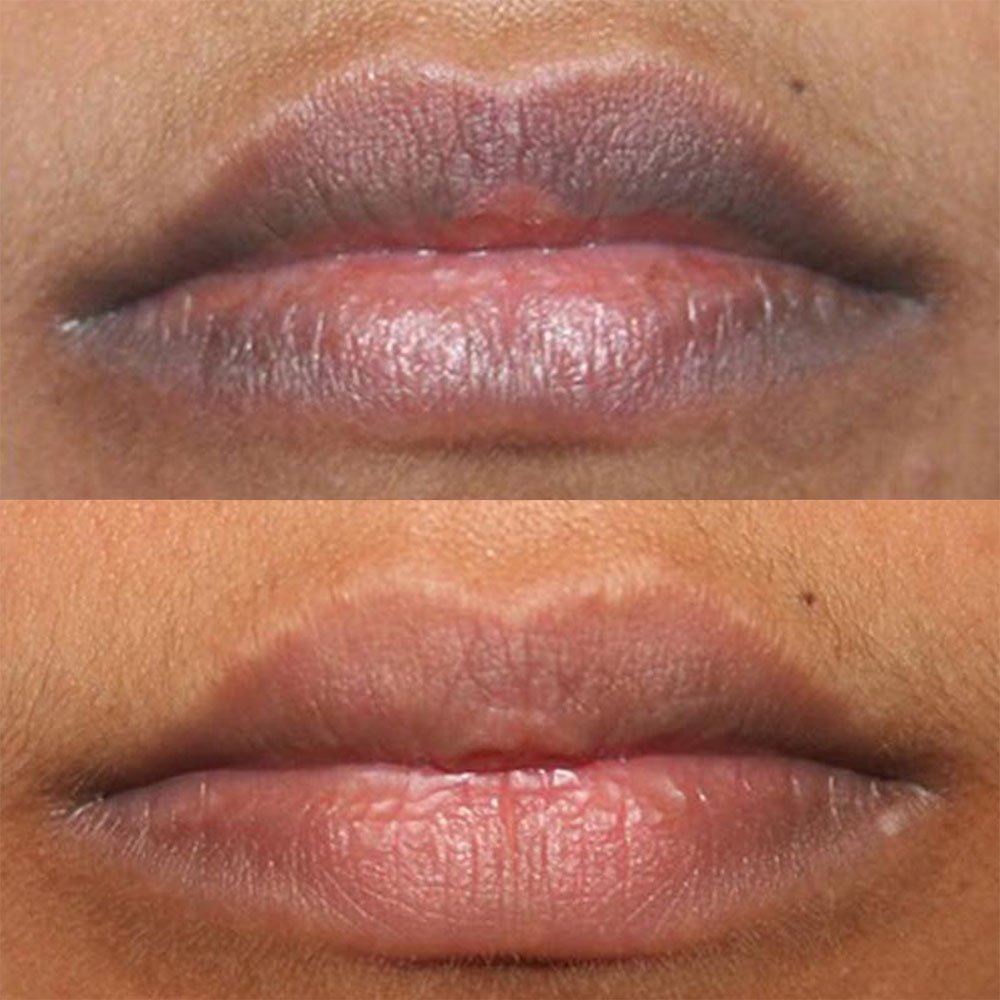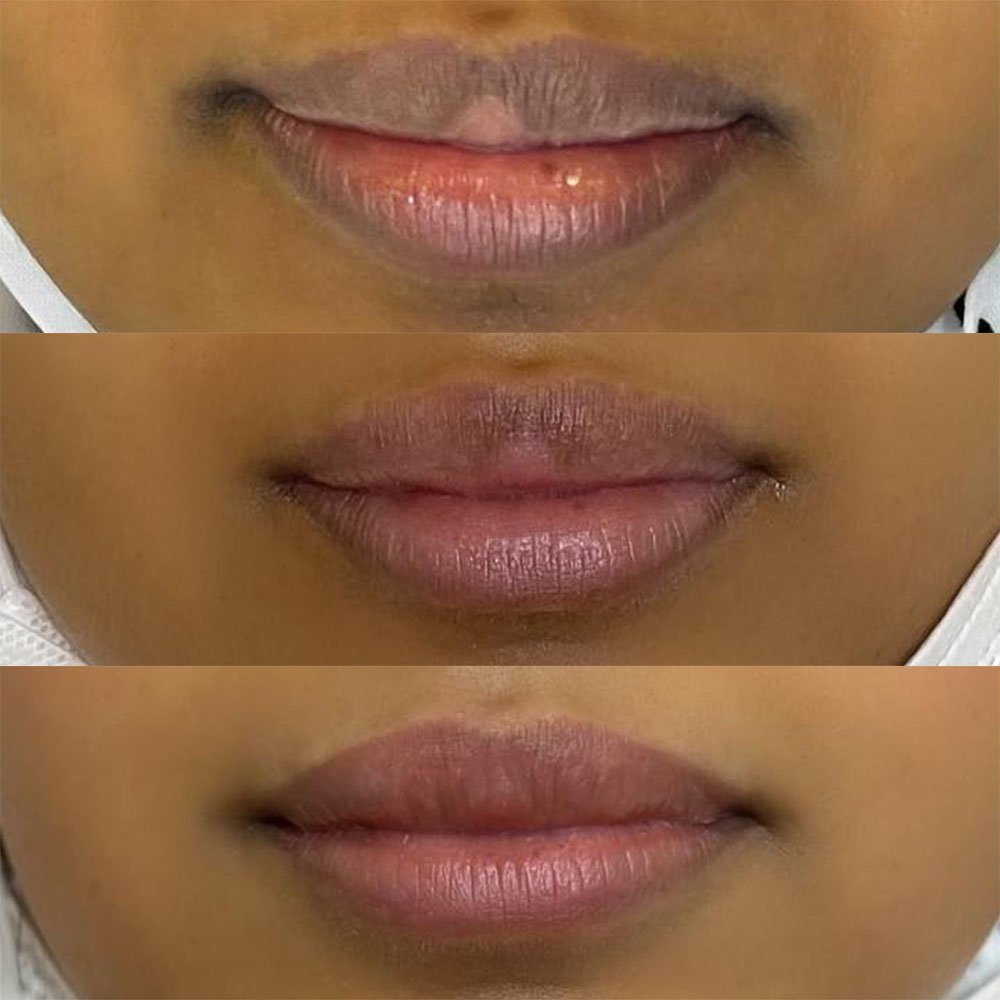Laser Lip Lightening: All You Need to Know
While genetically dark lips are totally normal, treatments that lighten and brighten them up are rising in popularity. Here’s everything you need to know about laser lip lightening.

Image source : PMUhub
Explore more laser treatment topics:
The lips are one of the most prominent features of anyone’s face, so it’s no surprise that we all want ours to look the best they can. Various makeup tricks and cosmetic procedures polish our lip texture, shape, and color.
One steadily rising trend is laser lip lightening. It helps correct excessive pigmentation in the lips, giving them a smooth, polished look that’s more harmonious with the rest of the face. It also lets your favorite lip makeup appear more vibrant.
PMUHub has researched in detail the laser lip lightening process, its effects and side effects, the appropriate aftercare, and treatment cost. Let’s dive right in.
What Is Laser Lip Lightening?
It’s basically a method of deep lip exfoliation. It entails exposing the lips to precisely targeted light and heat from a laser beam. The laser removes the targeted cells, just like other exfoliation methods.
The question is, can laser lighten lips? And the answer is a definite yes! Depending on the specific method, the laser will either melt the pigment deposits within the lip tissue, or destroy the overly pigmented surface skin itself and trigger resurfacing.
Either way, the result is a lighter, fresher lip look. Laser lip lightening is performed in clinics by doctors, licensed skin therapists, or even aesthetic surgeons as part of their comprehensive services.

Why Do Lips Go Dark in the First Place?
The color of our skin, hair, and eyes is determined by a pigment called melanin. Dark lips are a result of localized hyperpigmentation (the condition of having too much pigment in a specific area).
Human pigment cells (called melanocytes) are located in the upper layers of our skin. When hyperpigmentation happens, they overproduce melanin. It gathers in “clumps” which to us look like patches of darker discoloration.
There are a few different types of hyperpigmentation in humans. The most common ones include:
- Freckles
- Sun spots
- Melasma (a.k.a. “pregnancy mask”)
- Post-inflammatory hyperpigmentation
Lip hyperpigmentation can happen for a number of reasons, including:
- Dehydration
- Smoking
- Too much sun exposure
- Too much coffee
- A long-standing habit of sucking lips
- Allergic reaction to an oral product (e.g. lipstick, lip balm, toothpaste)
- Inflammation
- Lip trauma
- Chemotherapy
- Hormones
- Genetics
Of course, you don’t have to have any specific condition to want a lip pigmentation laser treatment. It’s also commonly used to smooth out the pigmentation of naturally dark lips.
In other words, laser lip lightening is both a medical and purely cosmetic procedure.
One thing that’s important to note is there’s nothing wrong with having genetically dark lips!
The best thing you can do for yourself is embracing your natural beauty, but if this is something that you feel is holding you back from living your best life, laser lip lightening is a relatively easy cosmetic fix.
How Does Laser Lip Lightening Work?
Lip pigmentation laser treatment targets and destroys the excess pigment in specific areas of skin. There are two types of laser treatment for dark lips: ablative and non-ablative.
Ablative Laser Lip Lightening
The ablative method targets the upper layer of the lip skin. First, a carbon emulsion is applied to the lips, to help conduct heat from the laser. Then the actual laser beam is applied.
The heat emitted from the laser destroys the skin cells in the top layer (this is commonly called vaporizing). That triggers the body’s natural recovery processes, including boosted collagen production. In that sense, laser lip lightening is similar to laser lip plumping.
The difference is the final result: instead of the lips becoming fuller, they become lighter. The body creates new, pink skin to restore the destroyed layer.
Ablative laser lip lightening effectively replaces the hyperpigmented layer with less pigmented tissue.
Non-ablative Laser Lip Lightening
The non-ablative method targets the layers deeper within the lips. Instead of destroying the skin cells, the laser breaks up the pigments beneath the surface.
This method takes somewhat more time and multiple sessions compared to the ablative approach, but it’s overall less aggressive and more effective long-term.
During the non-ablative treatment, the laser is first delivered in pulses that last around one nanosecond each. This breaks down the larger pigment particles in deeper layers of the lips.
Then the area is exposed to a second round of laser, this time in picosecond intervals (shorter than nanoseconds). The picopulses break down the smaller pigment particles in the shallower lip tissue.
This double treatment reduces the skin’s capacity for regenerating melanin in those particular areas. The limited capacity means melanin can’t be overproduced again, which means there’s far less chance of hyperpigmentation reoccuring in the future.
How to Prepare for the Procedure
Before you go in for your lip hyperpigmentation laser treatment, there are some general precautions you should take to make sure it all goes the best that it can. As a rule of thumb, you should:
- Avoid drinking any alcohol for at least 7 days prior to the appointment
- Stop any lip priming for at least 7 days prior to the appointment
- Avoid any other lip treatments (e.g. at beauty salons) for at least 7 days prior to the appointment
- Make sure to moisturize your lips throughout the week prior to your appointment
- Don’t use any exfoliators, scrubs, or home treatments/remedies on your lips for at least 3-5 days prior to the appointment
- Avoid smoking before your appointment
Your doctor or technician may give you more specific instructions based on your particular case. Follow them to the letter so your lips will be optimally prepared and you get the best results.
Does Laser Lip Lightening Hurt?
No, neither type of laser treatment for dark lips is a painful experience. The feeling of laser lip lightening is like an intermittent mild sting. Some people compare it to a rubber band flicking in your skin.
Since the laser is applied in a set rhythm, the sensation is easy to get used to and tune out. Moreover, your doctor will apply relief to your lips (usually a soothing product or a current of cool air) immediately post-treatment to minimize any redness or unpleasant afterfeeling.
That said, pain and discomfort are subjective categories.
If you’re worried that the sensation of the treatment will be too intense for you, or you just naturally have highly sensitive lips, share your concerns with your provider. Feel free to ask them for topical anesthesia.
Your doctor will apply either a numbing cream, gel, or a spray to eliminate any discomfort. In general, this is more often done with ablative treatments than with the non-ablative ones.
Lip Pigmentation Laser Treatment Side Effects
Using a lip laser for dark lips correction does entail some minor side-effects. They tend to last around a week and are easy to manage.
- You can expect to experience:
- Mild to moderate redness
- Minimal swelling
- Some sensitivity (like a mild sunburn)
- Temporary darkening of the targeted pigments
- Moderate scabbing or crusting with lymph discharge
- Flaking of the discarded hyperpigmented tissue
None of these side effects require any downtime. After your laser lip pigmentation laser treatment you can go right back to your daily routine. Your doctor might recommend a hydrating ointment or lip balm, and you should wear good SPF.
Protecting your sensitive lips from UV radiation is important because excessive sun exposure could mess with your healing process and retrigger hyperproduction of melanin.
Laser Lip Lightening Healing and Aftercare
Healing after a lip laser treatment for dark lips takes around 1-3 days for the most immediate aftereffects, around a week for the pigment shedding, and around 3 weeks for total healing and final check-up.
Here’s a comprehensive timeline of the laser lip lightening healing process and aftercare routine.
Days 1-3
On the first day, your lips might be mildly irritated and slightly swollen. It shouldn’t be intense and should go away within a day.
Keep your lips moisturized, use a lip SPF product, and avoid sun exposure as much as you can. If your doctor prescribed any healing ointments, use them as directed.
Be very gentle when washing your lips in the first few days. Use only clean water and forgo any facial products for now.
Days 4-14
Continue following your provider’s instructions for using your prescribed healing ointment. Maintain your efforts to hydrate your lips, keep using SPF throughout the day, and stay out of direct sunlight.
During this period your lips will begin expelling the targeted pigment. The treated areas will darken and crusts will form, looking somewhat like blackish scabs. You might also experience yellowish oozing. This is normal.
It’s your skin secreting lymph to help push out the pigmented cells. Don’t pick at your lips and don’t bother removing the lymph every minute. Let the crusts fall off on their own.
You can add a mild cleanser to your lip washing routine. It will remove the excess lymph without drying out your lips. It will also soften the scabs so they don’t feel tight or itchy.
Days 15-21
In the final week, your lips will stop crusting and the pigmented scabs will start falling off. The treated skin might feel dry at this point. Keep up with your prescribed ointment and feel free to add a nourishing, moisturizing lip balm to your routine.
It might be tempting to exfoliate or scrub the remaining crusts away, but stick to clean water and a mild cleanser. It’s crucial that you let the scabs fall off on their own.
If you interfere with the natural pigment expulsion, you might provoke the freshly formed skin and retrigger your body’s hyperpigmentation in nearby areas. Essentially, it’ll undo all your hard work.
Days 21+
At the end of three weeks, the targeted pigment will be expelled and your lips will be completely or almost completely healed. Contact your provider and schedule a follow-up appointment.
They will check how your recovery is coming along and how effective the laser lip lightening was for you. If necessary, they will arrange a touch-up session to treat any remaining pigmentation.

How Many Laser Lip Lightening Sessions Will You Need?
The total number of sessions you’ll need to achieve your desired results depends on a few factors. These include:
- How pigmented your lips are overall
- How the pigment in your lips is distributed
- How deeply the laser will need to be applied
- How your skin reacts to the treatment
- How well your lips heal after each session
Some people need only one lip pigmentation laser treatment, while others may need as many as 6 or more. As a general rule, though, most people require between 4 and 6 sessions total, including touch-ups.
How Long Do Effects of Laser Lip Pigmentation Removal Last?
As a rule, the effects of laser lip pigmentation removal are permanent. However, there are certain factors that might retrigger pigmentation in your lips. They include:
- Intense or long-term sun exposure
- Chronic smoking
- Medical conditions that predispose you to recurring hyperpigmentation
If any of these apply to you, you might need additional laser lip lightening sessions in the future. Discuss your specific circumstances with your provider and arrange for follow-ups as necessary.
How Much Does a Lip Lightening Laser Treatment Cost?
In general, you can expect the average lip lightening laser treatment cost to fall in the $1,450-$2,500 range, per session. The cost of laser treatment for dark lips depends on several factors, including:
- The type of laser used
- The technique applied
- The provider’s experience
- The clinic’s location, reputation, and portfolio
- Additional procedures and products (e.g. numbing agents)
- Number of sessions
- Any additional materials or treatments involved in the aftercare.
Ablative laser lip lightening is generally pricier than non-ablative treatments.
Laser Lip Lightening – Main Takeaways
Lip pigmentation laser treatment comes in two forms: ablative and non-ablative. They target different layers of the lip tissue, but the final result is essentially the same.
The laser removes the hyperpigmented cells and stimulates collagen production. This results in fresh, less pigmented skin and thus lighter, smoother lips.
The procedure is painless and quick (around 30 minutes). It has minimal side effects and your lips fully heal in around 3 weeks, though you can go back to your everyday activities on the same day.
Depending on your specific skin type and level of pigmentation, you may need a few touch-up sessions. After that, however, the effects of laser lip lightening are permanent. Consult your doctor and follow their instructions for the best long-term results.
weekly insight into PMU insdustry
Subscribe to our FREE newsletter. 100% good stuff.

support us so we can keep providing you with free education , information and inspiration.
